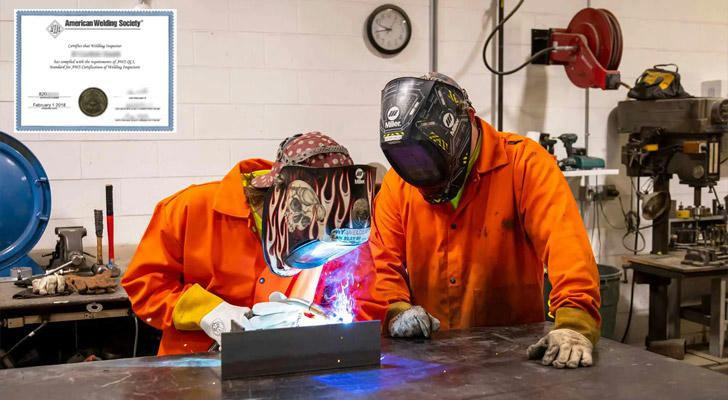Start your career as a welder apprentice – no experience required!
📢 Learn and Earn: AWS Certified Welder Apprenticeship + No experience required

In today's competitive job market, mastering a practical skill often leads to a more stable career than having an ordinary degree. The welding industry is such a field, with a strong demand for skilled workers and generous salaries. The Certified Welder Program launched by the American Welding Society (AWS) provides a "learn while earning" career path for those who are interested in the welding industry. Not only can they earn income during training, but they can also eventually obtain industry-recognized qualifications.
Why Choose the AWS Certified Welder Program?
1. No Worries About Expensive Tuition, Paid Training
Unlike traditional university education, the AWS Certified Welder Program is often sponsored by employers or unions. Trainees receive wages or stipends during the training period, avoiding the burden of heavy student loans.
2. Practice-Oriented, Quick Employment
This program emphasizes practical operation. Trainees learn various welding techniques (such as MIG, TIG, stick welding, etc.) under the guidance of experienced mentors. After graduation, they can directly enter the workforce without an additional adjustment period.
3. High Industry Recognition
AWS certification is one of the most authoritative qualifications in the American and even global welding industry. Welders holding this certificate are more competitive when seeking employment, and their salary levels are significantly higher than non-certified welders.
4. Broad Career Development Opportunities
Welding skills are widely applied in various fields such as manufacturing, construction, and energy industries (e.g., oil, natural gas). After obtaining AWS certification, welders can further pursue higher-level qualifications (e.g., CWI Certified Welding Inspector) to develop towards management or technical expert roles.
How to Join the AWS Certified Welder Program?
- Meet Basic Requirements: Typically, applicants must be at least 18 years old, possess a high school diploma or GED, and some programs may require passing basic math and reading tests.
- Find a Sponsoring Employer or Training Institution: Many unions (like UAW), community colleges, or manufacturing companies offer apprenticeship opportunities.
- Complete Training and Pass the Exam: The apprenticeship period generally lasts 1-4 years, after which trainees must pass AWS practical welding tests to obtain certification.
Here is the typical salary range for welding apprentices (AWS Certified Welder Apprenticeship Program) during the 1-4 years of training, based on industry averages and wage structures provided by unions (such as UAW, Ironworkers, etc.):(Work schedule: 8 hours a day, 40 hours a week)
AWS Welding Apprentice Salary Table (By Training Year)
| Apprentice Year | Hourly Wage (USD) | Estimated Annual Salary (40 hrs/week, 50 weeks/year) | Wage Percentage (vs. Certified Welders) |
|---|---|---|---|
| Year 1 | $15 - $20 | $30,000 - $40,000 | ~40%-50% |
| Year 2 | $18 - $25 | $36,000 - $50,000 | ~50%-65% |
| Year 3 | $22 - $30 | $44,000 - $60,000 | ~65%-80% |
| Year 4 | $26 - $35 | $52,000 - $70,000 | ~80%-100% |
Notes:
Factors Affecting Wages:
- Location (e.g., industrial states like California or Texas pay higher wages);
- Industry (e.g., oil/gas, shipbuilding sectors offer higher pay);
- Union benefits (some programs include health insurance, pensions, etc.).
Post-Certification Wages:
- AWS-certified welders earn an average hourly wage of $25 - $50+, with annual salaries ranging from $50,000 - $100,000+ (including overtime or specialized skill bonuses).
Data Sources:
- U.S. Bureau of Labor Statistics (BLS), UAW union agreements, and industry research from .
For more specific regional or industry wage data, consult local apprenticeship program websites or AWS-affiliated employer listings.
Conclusion
The AWS Certified Welder Program offers an ideal path for those who wish to quickly enter a high-paying technical industry. It not only resolves the conflict between "learning skills" and "earning income" but also lays a solid foundation for long-term career development. If you are interested in hands-on work and wish to establish yourself in a continuously growing industry, consider this practical and opportunity-filled career path.

